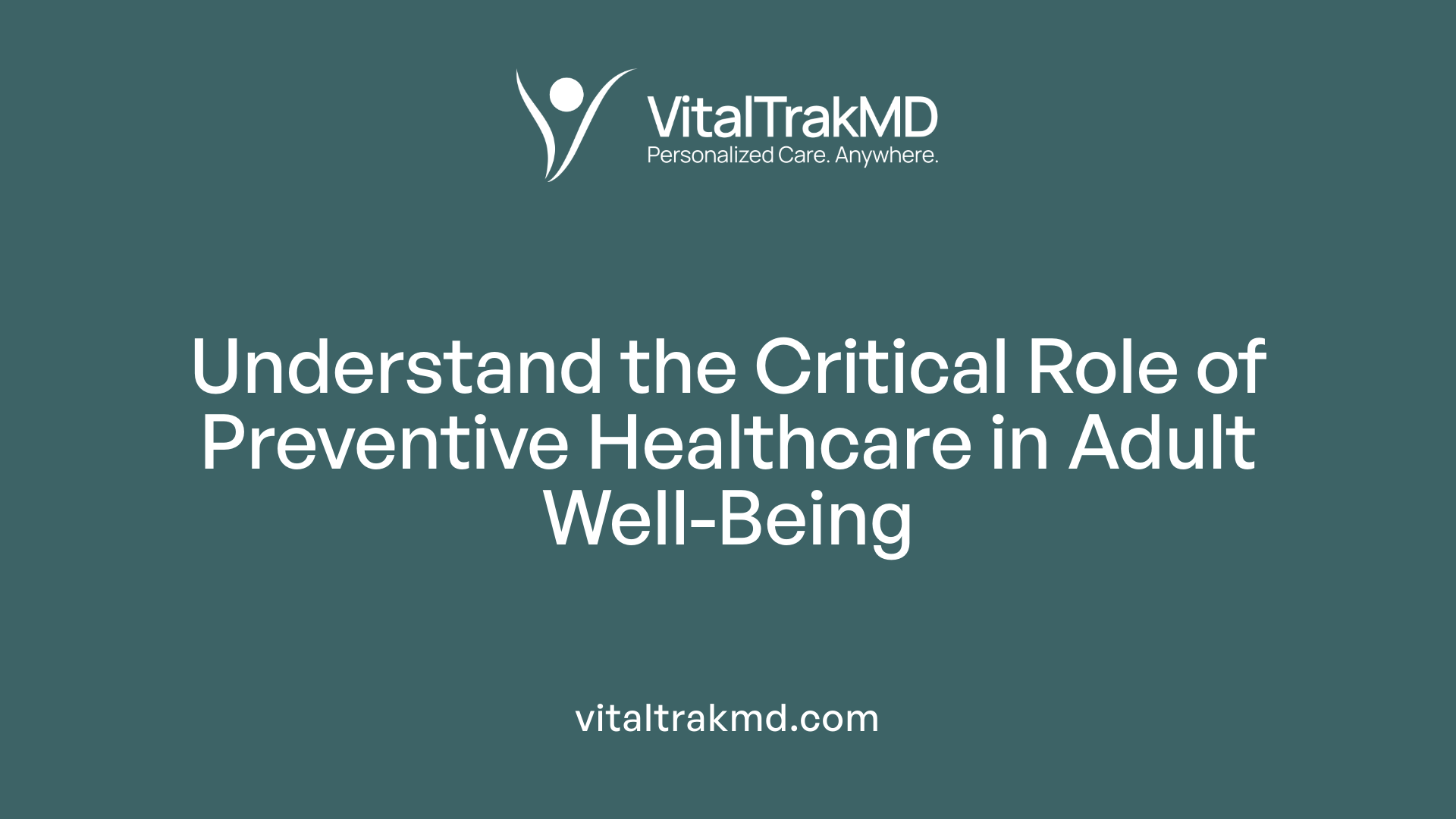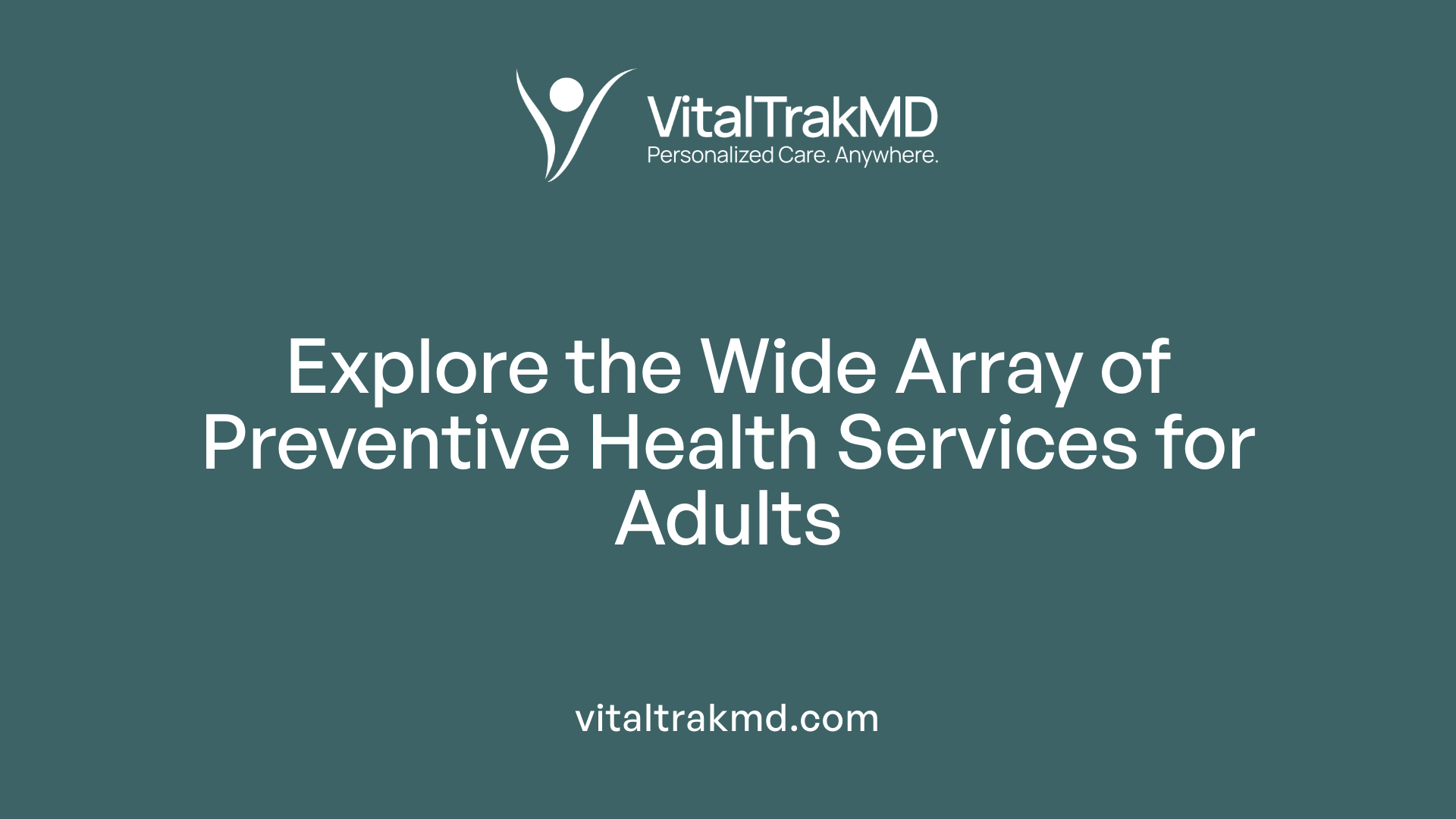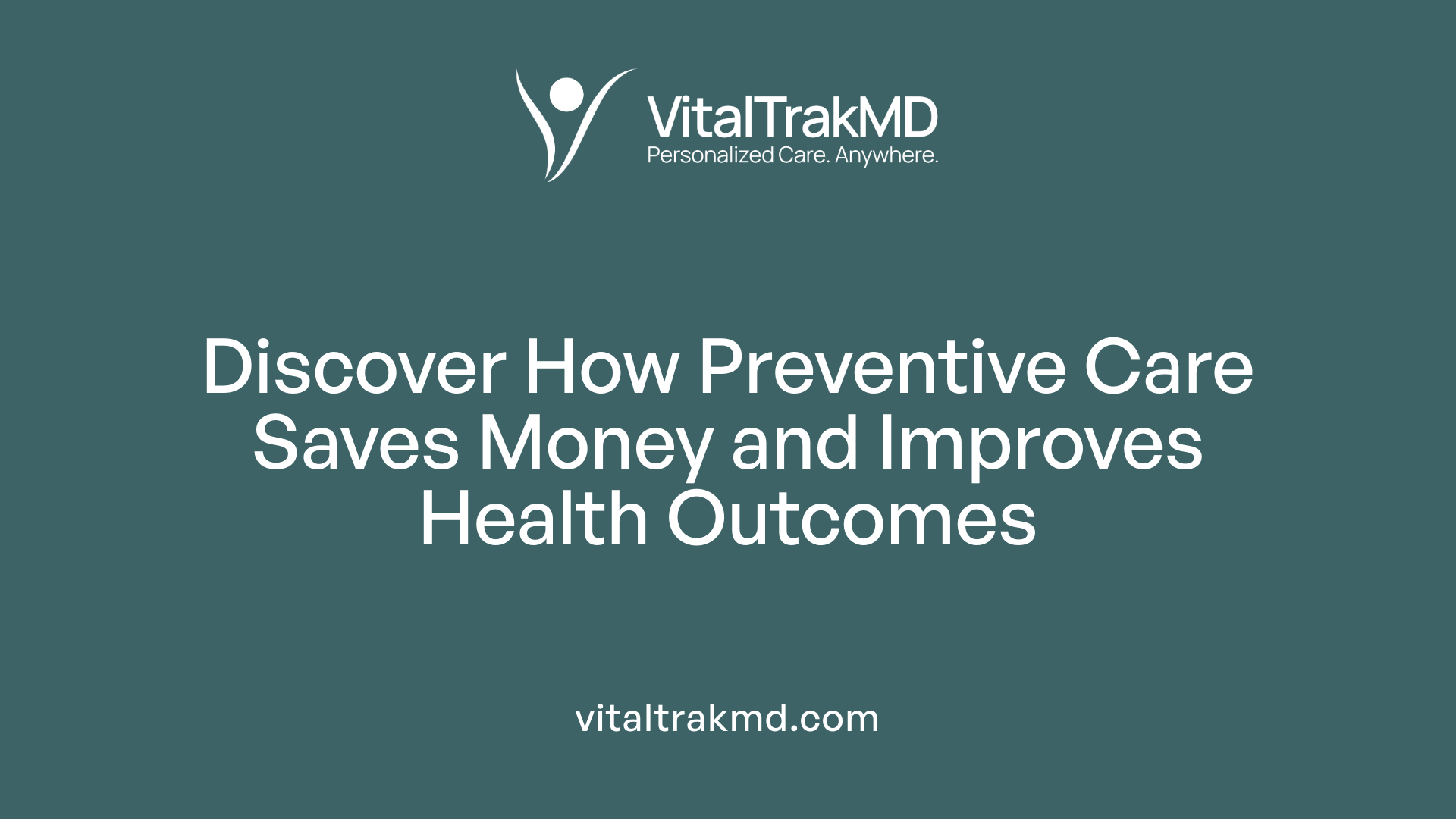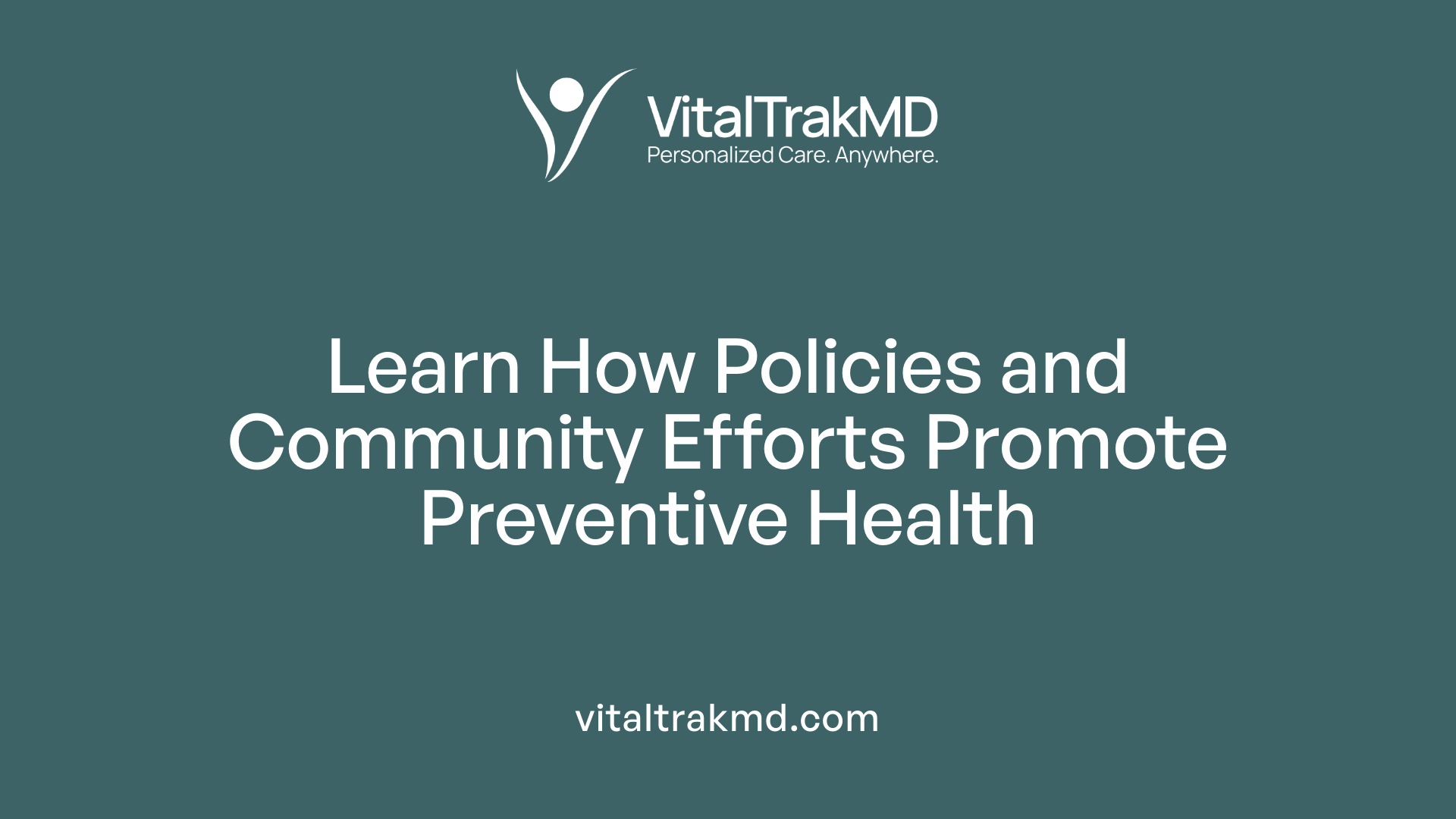Benefits of Having Adult Preventive Health Services

Understanding the Power of Preventive Healthcare for Adults
Preventive health services are a cornerstone of modern healthcare that focus on maintaining wellness, early detection of health issues, and disease prevention. These services include vital screenings, immunizations, wellness visits, and health counseling designed to protect adults from serious illnesses, reduce healthcare costs, and enhance quality of life. With laws ensuring coverage at no extra cost when provided by in-network providers, preventive care is accessible and essential for fostering healthier communities and individuals.
Significance of Preventive Health Care for Adults

What is the significance of preventive health care for adults?
Preventive health care plays a crucial role in maintaining adult health by emphasizing early detection and early intervention of potential health issues. It involves regular screenings, vaccinations, and health assessments that help identify conditions like cancer, heart disease, diabetes, and other chronic illnesses at an early stage.
These preventive measures allow for timely treatment, which can prevent illnesses from worsening and reduce the risk of complications. For example, cancer screenings such as mammograms, colonoscopies, and prostate exams are vital in catching cancers early when they are most treatable.
In addition to screenings, vaccinations against illnesses like influenza, COVID-19, and pneumonia protect individuals from preventable diseases and minimize health risks. Health assessments, including blood pressure and cholesterol tests, enable healthcare providers to advise lifestyle changes and medications that can improve long-term health.
Preventive health care also focuses on promoting overall wellness and longevity. Personalized health plans, including diet counseling, weight management, and smoking cessation, help adults adopt healthier lifestyles, which can lead to increased energy, improved mood, and longer lives.
Moreover, transitioning from a reactive to a proactive health system reduces healthcare costs by decreasing emergency visits and hospital stays. This approach also fosters better patient-provider relationships, encouraging adherence to health recommendations.
In summary, preventive health care allows adults to remain independent longer, enjoy a better quality of life, and reduce the burden of disease. It empowers individuals with knowledge and tools to take charge of their health, ultimately supporting healthier, longer lives.
Comprehensive Range of Preventive Services for Adults

What types of services are included in adult preventive health care?
Adult preventive health care encompasses a broad array of services designed to detect, prevent, and manage health conditions early on. This typically includes cancer screenings such as mammograms for breast cancer, Pap smears for cervical cancer, colonoscopies for colorectal cancer, prostate exams, and lung cancer screenings. Immunizations are also a vital part of preventive health, with vaccines available for influenza (flu), COVID-19, pneumonia, and shingles to protect against infectious diseases.
Routine tests like blood pressure and cholesterol screenings help monitor cardiovascular health and guide necessary interventions. Laboratory diagnostics are used to identify issues such as diabetes or vitamin deficiencies, enabling timely treatment and lifestyle adjustments.
Prevention strategies extend to behavioral counseling, where healthcare providers offer advice on quitting smoking, maintaining a healthy weight, and eating nutritious foods. These measures, combined with regular wellness visits, aim to keep individuals healthy and reduce the risk of developing serious health problems.
Most health plans are mandated by law to cover these services at no cost when delivered by in-network providers, encouraging proactive health management and early disease detection.
How Preventive Care Contributes to Cost Savings and Better Outcomes
 Preventive care plays a vital role in reducing the overall costs of healthcare while improving patient health outcomes. By identifying health issues early, preventive services can avoid the need for expensive treatments and hospitalizations that often result from unmanaged or late-diagnosed conditions.
Preventive care plays a vital role in reducing the overall costs of healthcare while improving patient health outcomes. By identifying health issues early, preventive services can avoid the need for expensive treatments and hospitalizations that often result from unmanaged or late-diagnosed conditions.
One of the main ways preventive health care helps cut costs is through early detection. Screenings for diseases like cancer, high blood pressure, and diabetes enable healthcare providers to initiate treatment at an earlier, more manageable stage. This approach reduces the severity of health problems and decreases the likelihood of complications.
Lower healthcare utilization is another benefit. As preventive measures include immunizations, blood pressure and cholesterol checks, and lifestyle counseling, they reduce the frequency of emergency visits and hospital stays. For example, managing chronic diseases proactively minimizes the need for costly emergency interventions.
Policies such as the Affordable Care Act (ACA) support cost-effective health strategies by mandating coverage of many preventive services without copayments or deductibles. This encourages people to utilize preventive care more readily, leading to earlier diagnoses and healthier lifestyles.
Furthermore, preventive health efforts contribute to decreased morbidity and mortality rates by catching health risks before they develop into serious illnesses. As a result, populations experience longer, healthier lives with fewer disabilities, which also lessens the economic burdens on healthcare systems.
| Aspect | Impact | Explanation |
|---|---|---|
| Cost reduction | Decreased overall expenses | Early interventions prevent costly treatments later |
| Healthcare utilization | Fewer emergency room visits and hospitalizations | Managing health issues proactively reduces urgent care needs |
| Policy support | No-cost preventive services through legislation | Encourages regular use of preventive measures |
| Health outcomes | Lower rates of disease-related disabilities | Early detection and management improve lifespan |
In sum, investing in preventive care not only saves money but also promotes healthier, longer lives. It helps shift healthcare focus toward managing health before emergencies occur, ultimately benefitting individuals and the entire health system.
Enhancing Quality of Life Through Preventive Health Strategies

Why is preventive care important for overall well-being and quality of life?
Preventive care plays a vital role in supporting a person's overall health and happiness. It involves regular screenings, vaccinations, checkups, and health counseling designed to catch potential health issues early before they develop into serious problems.
When health conditions like heart disease, cancer, or diabetes are identified early, treatment outcomes improve significantly. This early detection can prevent complications, reduce the risk of disabilities, and extend lifespan. For example, screenings such as mammograms and colonoscopies detect cancers early, when they are most treatable.
Preventive services also help maintain independence and active lifestyles, especially for older adults. Regular health assessments identify lifestyle risks related to nutrition, exercise, or substance use, enabling personalized advice that promotes healthy behaviors.
However, barriers such as costs, lack of awareness, or limited access to healthcare providers can prevent people from receiving these benefits. Educating the public and implementing policies that reduce these obstacles are crucial steps towards wider utilization of preventive care.
By focusing on healthy habits—like vaccination, diet, and exercise—and monitoring health status, preventive care reduces disease-related disabilities and prevents premature death. It also improves mental health by addressing conditions like depression and anxiety early, contributing to overall well-being.
Investing in preventive health not only enhances individual lives but also helps lower healthcare costs by avoiding expensive treatments for advanced illnesses. Building healthy communities through educational initiatives and accessible services ensures that more people can enjoy the benefits of a healthier, longer life, ultimately fostering a society where individuals thrive and maintain their independence.
The Role of Policy and Community Engagement in Promoting Preventive Care

Why should individuals complete recommended preventive health services?
Individuals should complete recommended preventive health services because these actions can significantly enhance health, save lives, and lower medical costs over time. Preventive care includes screenings, vaccinations, and health counseling that help detect and address health issues early, often before symptoms develop. This early intervention can prevent serious diseases such as cancer, heart disease, and diabetes, thereby improving overall health outcomes.
Supportive laws, like the Affordable Care Act, mandate that most health plans cover a broad range of preventive services at no cost to the patient when provided by network providers. This removes financial barriers that previously deter many from seeking necessary care.
By utilizing these free services, vulnerable populations—such as those with limited access to healthcare—are more likely to engage in health-promoting behaviors. This helps reduce health disparities and promotes health equity.
Preventive healthcare not only benefits individuals but also supports public health by reducing the overall burden of disease in communities. It lowers healthcare costs by decreasing the need for expensive treatments for advanced illnesses. Consequently, a society committed to regular preventive care fosters a healthier population with longer, healthier lives, and less strain on the healthcare system.
In conclusion, participating in recommended preventive services is essential for personal health, public health improvement, and cost savings. Ensuring access and awareness through policies and community programs continues to be vital for maximizing these benefits.
The Lasting Impact of Preventive Health Services
Investing in adult preventive health services is paramount for building healthier communities and ensuring individuals enjoy longer, more vibrant lives. By emphasizing early detection, vaccination, and health education, preventive care reduces the burden of disease, lowers healthcare costs, and enhances life quality. Overcoming barriers through policy, community engagement, and increased awareness is essential to maximize these benefits. As healthcare continues to evolve, a proactive approach centered on prevention promises a future where healthier, empowered adults contribute to resilient and thriving societies.
References
- Preventive care benefits for adults | HealthCare.gov
- Preventive Care - Healthy People 2030 | odphp.health.gov
- Preventive health services | HealthCare.gov
- The Benefits of Preventive Care and Regular Health Screenings
- Preventive Health: What Is It and Why Is It Important? - Healthline
- 10 Preventive Care Benefits for Adults | Southern Maryland Medical ...
- Are You Up to Date on Your Preventive Care? | Chronic Disease
Recent articles
Want to Feel Better and Live Healthier?
Join hundreds of patients taking control of their health with personalized care that fits their life – not the other way around.
Rated 4.8/5 by 32+ customers







